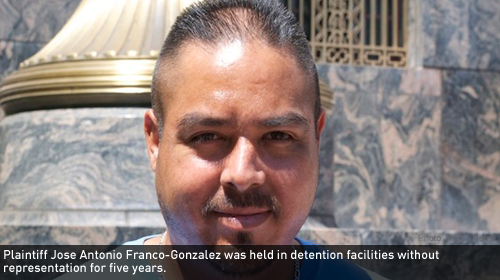Historic Decision Recognizing Right to Counsel for Group of Immigration Detainees


In a landmark ruling yesterday, Federal District Judge Dolly M. Gee ordered the federal government to provide legal representation for immigrant detainees in California, Arizona and Washington who have serious mental disabilities and are unable to represent themselves in immigration court. This is a historic decision ÔÇö it is the first ever to recognize a right to appointed counsel in immigration proceedings for a group of immigrants. Unlike the criminal justice system, where judges are generally required to appoint counsel for defendants who cannot afford a lawyer, there are no safeguards in the immigration enforcement system to ensure the basic fairness of having legal representation for immigrants. As a result, over half of all individuals in immigration court ÔÇö including 84% of detained individuals ÔÇö must face the complex legal proceedings alone and unrepresented, while the government is always represented by a lawyer.
The court's ruling will begin to correct this unjust system by providing essential protections for an extraordinarily vulnerable group ÔÇö immigrants with serious mental disabilities whom the government imprisons while their cases remain pending. As Judge Gee found, the appointment of a legal representative for such individuals "serves only to level the playing field by allowing them to meaningfully access the hearing process."
The government denied such a level playing field to Jos├® Antonio Franco-Gonzalez. Jos├®, now 33, has a cognitive disability; he did not learn to speak until he was six or seven years old, he does not know his own birthday or age, he has trouble recognizing numbers and counting, and he cannot tell time. He functions at the cognitive level of a child; by some measures, as young as two years old.
In April 2005, after serving a sentence in state criminal custody, Jos├® was transferred to immigration detention. A few months later, an immigration judge ordered the closure of his case, citing the finding by a government psychiatrist that Jos├® lacked even the most basic understanding of his immigration proceedings. Despite the fact that there were no open removal proceedings against him, Jos├® remained incarcerated for another four and a half years. Because he didn't have an attorney, Jos├® never stepped foot into a courtroom during that time. Finally, after an attorney learned of Jos├®'s case and filed a habeas petition in federal court seeking his release, Jos├® was released from custody in March 2010.
Like Jos├®, hundreds of other immigrant detainees spend months, sometimes years, in detention without legal representation, even though they are not able to defend themselves or even understand the proceedings against them. └¤░─├┼┐¬¢▒¢ß╣¹ 34,000 individuals are put in immigration detention daily, and according to government estimates, 1,000 of those individuals have mental disabilities. Yet it took three years of hard-fought litigation to get to this historic ruling, because the government maintained that there was nothing wrong with an immigration system that left people like Jos├® to defend themselves against trained government attorneys in their removal proceedings, despite their serious mental disabilities.
Judge Gee's ruling also requires that all immigrant detainees in California, Arizona and Washington with serious mental disabilities who have been detained for more than six months must be provided with a bond hearing where the government must justify continued detention. Hundreds of immigrant detainees in these three states, many of whom are unnecessarily detained under so-called "mandatory" detention statutes, will finally have an opportunity to ask an immigration judge for their release.
This ruling is a huge step in ensuring that our immigration system is fair and humane. Recently, in response to the imminent issuance of today's court order, the government announced that it will change its policies nationwide to provide procedural safeguards to immigrant detainees with serious mental disabilities. While it is a shame that it took a federal lawsuit and protracted litigation before the government took any action to protect this vulnerable population, it is necessary that, going forward, the federal government commit to implementing systemic policy changes that protect individuals like Jos├®. As the country engages in a debate over comprehensive immigration reform, it is important to remember that principles of due process, fairness, and humanity must govern our immigration enforcement policies.
Learn more about immigrants' rights and other civil liberty issues: Sign up for breaking news alerts, , and .

